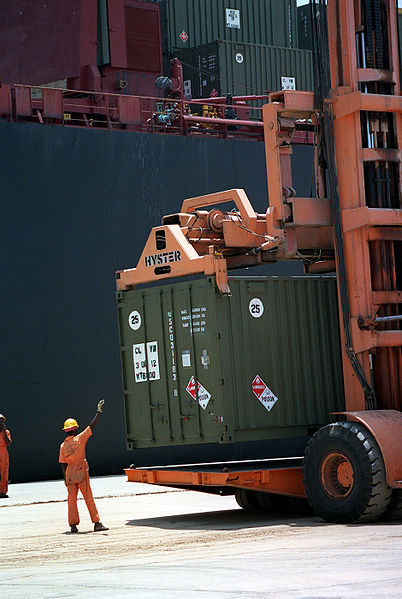ILA Stance Is Worse Than Just Threatening Strike
Sometimes bad news isn’t as bad as it appears. This isn’t one of those times.
Last week, I wrote about the International Longshoremen’s Association (ILA) using the word shippers most fear hearing from one of the giant unions that control the jobs at the ports all along U.S. coasts: strike.

A strike by the ILA or International Longshore & Warehouse Union (ILWU) would shut down all the ports along a whole side of the country, massively disrupting national (and global) supply chains while costing the U.S. economy billions of dollars per day. That’s not an exaggeration. A study by the National Association of Manufacturers and the National Retail Federation found such a strike, lasting at least five days, would cost the economy $2.5 billion per day. Granted, that was almost a decade ago and specifically for the ILWU. However, with the high amount of inflation we’ve seen since that 2015 study, the dollar cost would now likely be significantly higher, no matter which side of the country gets its ports shut down.
Luckily, threats of strike are much more common than actual strikes, but the more you dig into what the ILA and its president, Harold Daggett, are saying, the more serious this potential threat is. And Daggett’s words are worse than merely warning there’s a chance of a strike. Three things stand out to make this story even worse than it appeared in the blog I wrote last week.
First, and unsurprisingly, Daggett is drawing a hard line on automation. This will create contention in negotiations, and it is hard to imagine the issue will be worked out before the current contract expires.
Second, the ILA wants no White House mediation, even if negotiations go south.
Third, if union demands are not met before the current contract expires, Daggett says ILA dockworkers will not continue working under current contract terms until a new contract is reached. “We will be in the streets,” he said, clearly referring to picketing during a strike.
Last week was Miller Time; I used an excellent article by Greg Miller in FreightWaves as my main source for what Daggett and the ILA were saying. Today, I lean on the heraldry of Michael Angell in a Journal of Commerce (JOC) article.
Automation
Here’s what Angell reported on Daggett drawing a line between the ILA and its contract negotiations versus those of the ILWU on the issue of automation:
In 2008, the ILWU agreed to language in their collective bargaining agreement that conceded “new technologies … necessarily displaces traditional longshore work and workers.” The ILWU’s current leadership, whom the ILA supported throughout their negotiations, inherited the concession as part of their current collective bargaining agreement.
Daggett said the ILA will again seek strong protections against the introduction of full automation at any East or Gulf coast marine terminals. Reading a letter from a “casual” ILWU member about the impact of automation on full-time longshore employment, Daggett said the casual was a “casualty” due to the lack of protection against automation at West Coast ports.
“We are not the ILWU, we are nothing like the ILWU,” Daggett said. The automation that was implemented at terminals at the Ports of Los Angeles and Long Beach under the ILWU’s earlier contracts “should have never happened, but it happened anyway,” he said.
It’s not surprising that the dockworkers unions would fight against automation. They see automation as an existential issue. In theory, a 100% automated port would need no dockworkers, right?
However, the ports need automation to create the ability to handle larger and larger amounts of cargo that move through them. Unions fighting against automation at U.S. ports has caused our ports to fall behind ports in Asia and parts of Europe in efficiency and capacity. This played a large role in the bottlenecks and port congestion we saw during the shipping boom of the pandemic. Ports simply were not able to handle the high level of cargo moving through them.
Typically, cargo volume moving through the ports increase year after year. If ports fail to upgrade their ability to handle more cargo, they will not be able to meet the demands ahead of them. Employers at the ports and the ILA are going to have trouble seeing eye to eye on this issue.
Daggett acknowledged ILA dockworkers are not reaching the number of moves per hour the union promised the USMX during previous contract negotiations in order to stave off automation. He urged locals to up efficiency in order to help get them a good contract.
Mediation
I expect to start hearing about letters to the White House from groups of shippers begging the president to ensure a smooth transition to a new ILA contract very soon. The ILA wants none of it.
[Daggett] said the union will reject any efforts by the federal government to intervene in the talks should the ILA and USMX [United States Maritime Alliance] not come to terms.… “We will not be interested in Biden sending us a mediator if negotiations are not going well.”
To me, these words are worse than the strong things Daggett had to say about automation. Automation is always a contentious point in union contract negotiations, whether you’re talking about the ILWU or ILA. But a preemptive refusal of mediation? That sounds like a side is only interested in getting its demands met rather than actually negotiating.
Mediation can obviously be a powerful tool for helping two sides reach resolution in negotiations. Mediation has often been necessary in union contract negotiations at the port.
President Biden has called himself “the most pro-union president in American history.” If the ILA isn’t interested in supposedly the most union-friendly president’s administration acting as mediator between it and its employers, I don’t like the chances of a new contract being reached before the current one expires.
Strike as Soon as Contract Expires
The way Daggett is talking, it doesn’t sound like he’s merely threatening strike for leverage. It sounds like he’s planning to lead the ILA in a strike. He’s not willing to negotiate on any terms until the union’s pay raise demands are met, and he’s not willing to let dockworkers keep working once the current contract expires if there’s not a new one in place. Here’s what Angell reported on this:
[USMX and the ILA] failed last month to agree on new pay raises, the union’s president said Tuesday, slowing further progress in contract talks and prompting the union to warn members they should “start saving money” to prepare for the possibility of the first coastwide strike in 47 years in 2024.… at a meeting in Nashville for ILA locals along the South Atlantic and Gulf Coast, [Daggett] said maritime employers need to provide a “substantial” increase in hourly wages before talks on other contract terms can begin, adding that ILA’s 45,000 members will walk off the job if there’s no signed deal in place before the current contract expires on Sept. 30, 2024.
…
“The ILA has not had a coastwide strike since 1977, but we must be prepared if our demands are not met,” Daggett said. He told local representatives at the meeting they need to prepare their members for a potential loss of income from a walkout.
“Start saving money because that day may come,” Daggett said.
…
“I want wages done first, and then we’ll sit down and negotiate the contract,” he said. “Our current contract expires in less than a year and we are facing the most challenging negotiations in our history.”
Daggett said the ILA outlined its most recent wage increase proposal to the [USMX] at an October meeting in Newark, New Jersey. But he said ILA walked out of the meeting after two and a half hours after it appeared the USMX was not interested in the proposal but “wanted to play hardball.”
“I wish I could report that the exploratory talks we have had with the USMX have led to an understanding, but I can’t,” Daggett said.
He did not say what the union is seeking for a pay raise. But he pointed to the recent contract that the United Auto Workers secured from Ford Motors that will bring the lowest hourly straight-time wage autoworker from $18 per hour up to $40 over four years as an example of the strong wage increases that other unions have been able to secure recently.
“The ILA expects the companies to compensate its workforce with a substantial increase in hourly pay,” Daggett said.
Daggett also rebuffed the idea that the ILA would remain on the job, as did members of the [ILWU] when their contract expired in July 2022….
“There will be no extensions like the ILWU did. We will be in the streets,” Daggett said.
As I talked about in the previous blog, reaching a new contract before the current expires goes against the unions’ traditional modus operandi. However, we’ve seen much smoother contract transitions over the last decade. Unfortunately, we now seem to be moving back in the wrong direction.
A new ILA contract before the current one expires doesn’t look likely, and the ILA says it will strike if a new contract isn’t reached by then. Thankfully, there’s still the better part of a year before the contract expires on September 30th, 2024, so there still is time. But shippers would be wise spending that time preparing for the eventuality of a strike at East and Gulf Coast ports.





